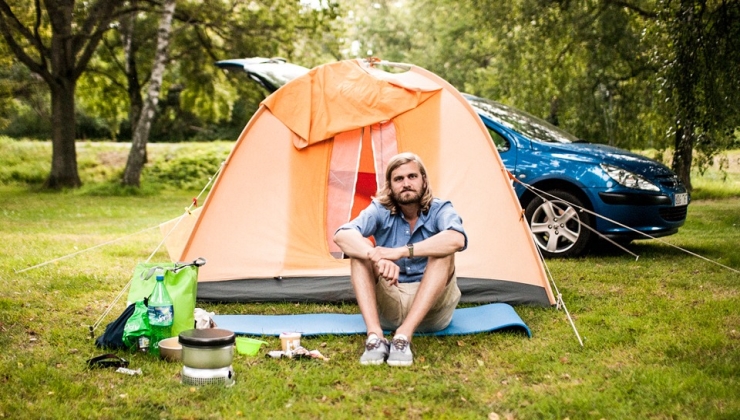What’s great about camping is that it’s a year-round hobby. No matter the time of year, you can always find wonderful places available to visit.
Typically, camping refers to the summer season. But many locations also show their charm and beauty in winter, spring, or fall. This means that the same spot can look completely different and offer a new experience every time you visit it.
Each camping season has its own features. Particular attention is required when preparing for winter camping because in order to comfortably spend time outdoors during the snowy season, it is essential, firstly, to have the necessary equipment and a 2-person tent with a stove to stay warm. Secondly, you need to learn more about traveling in a particular season in order to know what to be prepared for, as well as to avoid mistakes and disappointments.
Here are some basic seasonal tips for a successful and enjoyable outdoor experience in camping.
Summer Hike
Summer is the most popular season for traveling and camping as it is warm and sunny, and you can enjoy nature to the fullest. But even in summer, there are several points to consider when planning your trip.
Insects and bugs
One of the most annoying problems of summer is insects and bugs. These creatures can hide around you, in your tent, and even in your food. Whether you’re trying to get a good night’s sleep at camp, hiking, or eating, insects can ruin the whole experience. So be sure to bring insect repellent with you to protect yourself.
Warm Clothes
Summer is the hottest season, but at night the temperature drops. The weather can also change quickly, especially in the tropics. So make sure you have a warm sleeping bag and enough clothing.
Campsite
When looking for a tent site, choose one that is shady and out of direct sunlight. A heated tent on a hot day is pure hell.
Stay Hydrated
Hydration is especially important in hot weather. Therefore, always carry water with you to stay hydrated until you find a source of drinking water near your campsite.
Fall Camping
Fall is one of the most beautiful and fascinating times of the year. In addition, fall hikes can be good preparation for winter hikes. Here are some points to keep in mind.
Campgrounds Availability
Unlike in the summer and spring, many campgrounds may be closed in the fall. Therefore, plan your trip and check in advance whether the campsites you are interested in are available.
Cold Protection
Bring a warm sleeping bag and a pad to keep warm. Tarps and footprints can also help keep out the cold.
Heaters
Since fall can often be damp, it’s a good idea to buy a portable heater to keep you warm and dry your clothes and shoes if necessary.
First Aid Kit
When traveling in the fall, it is easy to catch a cold. Therefore, take with you a first aid kit with antipyretic and antiviral drugs.
Spring Camping
Spring is another popular season for camping. The weather at this time of year is still warm and comfortable, making this season an attractive option for planning a trip. Here are some tips to keep in mind when choosing a campsite this season.
Weather Changes
In spring, the weather can change quickly, with heavy rain and sometimes snow. Bring plenty of warm clothing, extra shoes, and a portable heater to ward off the cold. Also, bring a tarp to provide extra insulation for your tent.
Flashlights & Batteries
Since the sun sets earlier in the spring, bring a flashlight and batteries with you – this will help you spend the night comfortably and not wander around in the dark. Also, don’t forget a power bank to charge your gadgets. As a bonus, it’s worth bringing a portable lamp with you so you have light while hiking.
Avoid Lowlands
You should not set up tents in the lowlands, as it may rain heavily in the spring. Water from the hills will flow directly into the tent, and ignoring this fact can lead to flooding of your camp.
Winter Hike
This is a completely new experience. The feeling of snow, white treetops, and various activities make winter hiking fun and unforgettable.
Layers Of Clothing
Wear two layers of clothing. The outer layer protects against water and moisture, while the inner layer provides warmth. It is also important to protect body parts such as the head, arms, legs, and neck.
Explore The Location
Before your trip, gather information about the area. Find out where the nearest hospitals and pharmacies are. Mark water areas on the map to avoid the risk of falling through the ice due to the snow surface. Also, be aware of avalanche danger in some areas.
Stove
To cope with harsh winter weather, prepare a well-protected tent. It is advisable to purchase a portable wood stove that can be transported in your car and used to heat your tent in winter.
Beverages
Carry a thermos with you and drink plenty of hot drinks such as tea, cocoa, and coffee to keep warm and prevent dehydration. Also, avoid drinking large amounts of alcohol, as it increases the rate at which your body loses heat.
In Conclusion
Camping is a great hobby that allows you to take a break from everyday life and enjoy nature. Here you can try different activities that will be interesting to you and your friends. The list of possible options is limited only by your imagination and capabilities.
If we are talking about camping, then various sports can make your trip truly exciting and enjoyable. In addition, every season of the year is perfect for observing nature, taking photographs, finding inspiration, or challenging yourself!

